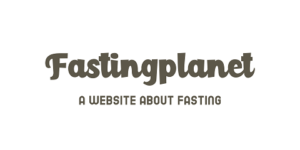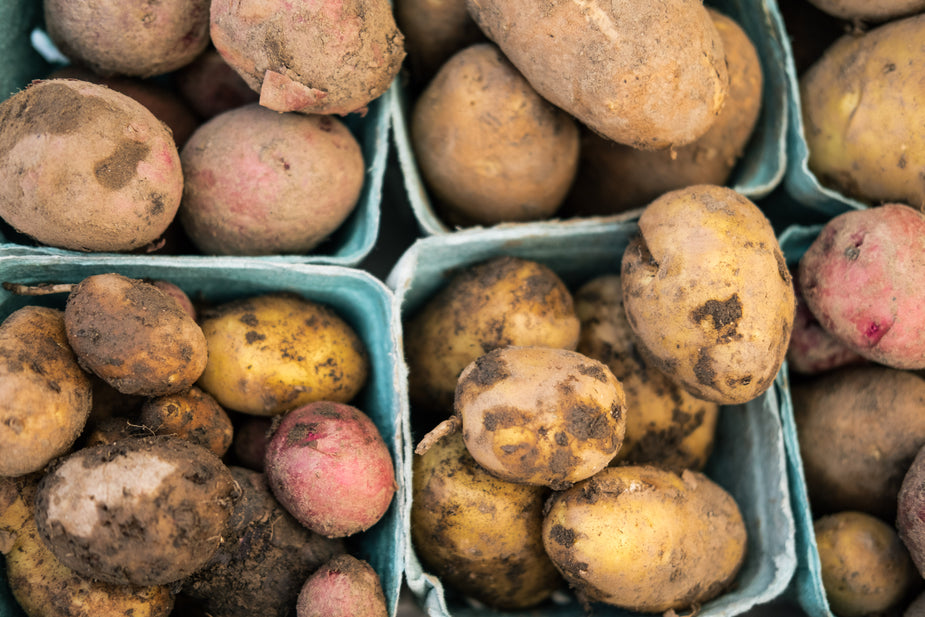Last Updated on November 9, 2023 by Fasting Planet
Potatoes are a starchy, filling vegetable that comes in many shapes, sizes, and even colors. Useful for more than merely a side dish, potatoes can be a meal in and of themselves. Do vegans eat potatoes often or do they opt for other veggies instead?
Vegans do eat potatoes, but keep in mind that the potatoes typically have to be plain to still qualify as vegan. You can always sub out milk, cheese, and bacon and use vegan replacements for a potato dish that fits into your diet and fills you up.
In this article, we’ll discuss more on where potatoes fit into the vegan diet, including the benefits of potatoes. At the end, we’ll share some of our favorite vegan-friendly potato recipes so you can continue expanding your plant-based cooking repertoire. You won’t want to miss it!
Do Vegans Eat Potatoes?
The vegan diet omits all meat, poultry, eggs, dairy, fish, seafood, shellfish, honey, and other animal byproducts. Your diet instead revolves around plant-based foods such as vegetables, fruits, soy, lentils, and grains.
Since potatoes are a vegetable, they’re not off-limits to vegans. Nothing about a potato is animal-based, nor does this spuddy food contain any animal byproducts.
We mentioned in the intro that potatoes are available in many colors. The vitelotte potato, for example, is a deep, rich royal purple on both the outside and inside. Laura potatoes have a nice red exterior skin and sweet potatoes are orange inside. Some potatoes are even blue.
These colors are all-natural and result from a substance called anthocyanin. This flavonoid/antioxidant produces hues such as blue, purple, and red in all sorts of food, not just potatoes. Cherries are red due to anthocyanins. Cranberries, red cabbage, aubergine, blueberries, blackberries, and blackcurrants are also their respective unique shades thanks to the substance.
Potatoes with more anthocyanin are darker and colorful while those with less of the pigment don’t have as noticeable of a color.
Unlike some plant-based foods which don’t provide much satiety, eating potatoes as a vegan will leave you full for a while, as one medium-sized potato contains 4.7 grams of dietary fiber and 4.3 grams of protein.
You’re also ingesting:
- 163 calories
- 2 grams of total fat
- 13 milligrams of sodium
- 897 milligrams of potassium
- 37 grams of carbs
- 7 grams of sugar
- 2 percent calcium
- 70 percent vitamin C
- 9 percent iron
- 30 percent vitamin B6
- 12 percent magnesium
What Are the Benefits of Eating Potatoes?
Compared to most vegetables, which can be light calorically, potatoes are a bit heavier. This veggie is also loaded with carbs. While you maybe don’t eat potatoes every day as a vegan, there are plenty of great reasons to incorporate the spud into your diet more than you might already be doing so. Let’s talk about these health perks now.
They’re Gluten-Free
If you’re reducing or cutting gluten altogether and also going vegan, modifying your diet even further has undoubtedly been tough. One comfort food you don’t have to give up through all this change is potatoes. The vegetable is naturally gluten-free so you feel fewer uncomfortable side effects of gluten insensitivity.
Do be forewarned that any potato-based recipes besides plain potatoes might add gluten, such as potato bread.
Could Help with Digestion
Foods that improve digestion are smart for your diet, and potatoes are one of them. Potatoes contain resistant starch, a type of starch that, when digestion occurs, leaves the small intestine while still undigested. This means your digestive tract has to work less hard to process resistant starch.
As the resistant starch travels to your large intestine, your gut bacteria consume it, then make it into short-chain fatty acids. The resistant starch in potatoes becomes a particular fatty acid called butyrate, which gut bacteria eat quite hungrily.
Resistant starch may better your health by lessening your appetite, reducing your blood sugar, and boosting your insulin sensitivity. Butyrate could lower colorectal cancer risk and colon inflammation, says this 2011 report in the World Journal of Gastroenterology.
Contains Many Antioxidants and Nutrients
Sure, potatoes are carb-heavy, but you know what else they’re heavy in? Antioxidants and nutrients!
The antioxidants in potatoes include phenolic acids, carotenoids, and flavonoids. These and other antioxidants can reduce the effects of freed radicals on the body, which may safeguard you from developing cancer, diabetes, and heart disease.
If you can, choose colorful potatoes over white potatoes if you want the biggest dose of antioxidants in your lunch or dinner. According to data from Preventive Nutrition and Food Science as well as other reports, colored potatoes may contain up to four times the antioxidants.
Besides the ones we mentioned in the last section, here are more nutrients and minerals in a medium-sized baked potato:
- Folate – 12 percent of your daily recommended limit
- Niacin – 12 percent of your daily recommended limit
- Phosphorus – 12 percent of your daily recommended limit
- Manganese – 19 percent of your daily recommended limit
Could Promote Heart Health
We have to talk about the potassium in potatoes, as per spud, you’re ingesting more than 800 milligrams of the mineral. In those quantities, you could do your heart a favor each time you eat a potato, says this 2011 study from JAMA Internal Medicine. You do have to reduce your salt intake to reap the most benefits, the data states.
The study involved more than 12,000 participants whose health was tracked for nearly 15 years. During that time, 2,270 of the participants died. The researchers found that the participants who ate more sodium than potassium were at risk of “all-cause mortality.” Compared to the ones who ingested potassium more than sodium, their risk of death was less.
May Lower Blood Pressure
Hypertension or high blood pressure, when uncontrolled, puts you at a higher risk for heart disease, vascular dementia, kidney disease, aortic aneurysms, peripheral artery disease, heart failure, stroke, and heart attack.
The same low-sodium, high-potassium diet from above may be able to ward off hypertension or control blood pressure in those who already have this condition. How? All the potassium in potatoes and other foods allows your blood vessels to expand, which is known as vasodilation.
Vegan-Friendly Potato Dishes to Make Tonight
As we said we would, let’s talk about some great vegan potato dishes you can whip up anytime, be that for your visiting friends, family, or just for yourself!
Vegan Scalloped Potatoes
Scalloped potatoes are a classic side dish, but their cheesy goodness means vegans have to give them up. Or do they? Vegan scalloped potatoes use dairy-free milk and vegan sour cream to mimic the real dairy this dish is known for. Add extra flavor to your vegan scalloped potatoes with pepper, salt, sweet paprika, garlic, and some red onion. So easy!
“Loaded” Sweet Potatoes
A loaded potato usually includes chives, cheese, bacon, and sour cream, but not on the vegan diet. Try loading your potatoes with guacamole and baked beans instead. Oh, and swap out the regular white potato with sweet potato too since you’re changing this dish enough. You won’t miss regular loaded potatoes anymore, that’s for sure.
Potato Focaccia
Focaccia bread with rosemary, olives, and potatoes feels like something you’d order at a luxe Italian restaurant, but now you can enjoy this fancy vegan dish anytime you want at home. Here’s a recipe to follow, as this meal is a bit more complex than the ones we’ve discussed so far.
You need ingredients like extra virgin olive oil, cubed potato, chili flakes, crushed garlic, and pitted, sliced olives. Definitely set aside some extra time for this recipe, as making bread dough alone can take a few hours.
Vegan Mashed Potatoes
Mashed potatoes are creamy from dairy milk, hence why you’ve avoided this dish. To make your mashed potatoes vegan-friendly, swap out the dairy and use vegan cream cheese, vegan butter, and almond milk. If you’re not such a fan of almond milk, try soy milk or another non-dairy milk of your choosing.
Roasted Potatoes
If you skip a lot of oils on your vegan diet, then roasting potatoes can be a challenge. Until now! Semolina and aquafaba can act as oil. What is aquafaba, you ask? It’s the liquid you’ll find in every can of chickpeas. Pour the contents of the can into a bowl, straining the chickpeas through a sieve. You’ll end up with useable aquafaba.
Your potatoes will have a nice crisp if you cook them at 450 degrees Fahrenheit.
Vegan Smiley Fries
You know smiley fries, as if you have kids, that’s probably the only way they’ll consume potatoes. By making these fries at home, you can ensure the smiley spuds contain no oil, allergens, and gluten. They’re also paleo on top of being vegan.
Egg replacer, potato starch, and potato flakes are the three main ingredients. Sea salt, garlic powder, onion powder, and black pepper add more flavor, but maybe skip these seasonings for the kids.
Roasted Greek Potatoes
Dress up your average roasted potatoes with this Greek spin on the recipe. To make roasted Greek potatoes, you need cornstarch, oregano, sea salt, garlic powder, lemon juice, vegetable broth, and Russet potatoes. Your friends and family will be impressed when they taste this delicious dish!
Conclusion
The starchiness of potatoes doesn’t only heap on the carbs, but the protein and dietary fiber as well for satiety. Potatoes are a regular part of the vegan diet, and why not? Vegans can enjoy potatoes in so many ways, using dairy substitutes to make mashed potatoes, loaded potatoes, scalloped potatoes, and more.
With lots of nutrients, antioxidants, and resistant starches, do yourself a favor and enjoy a potato today!

